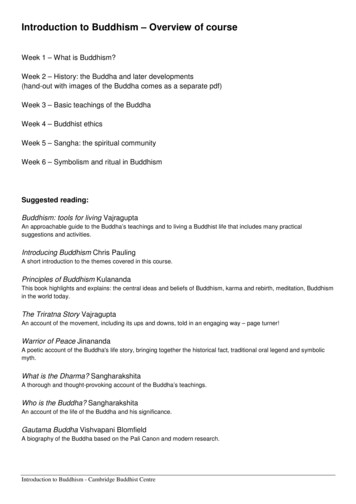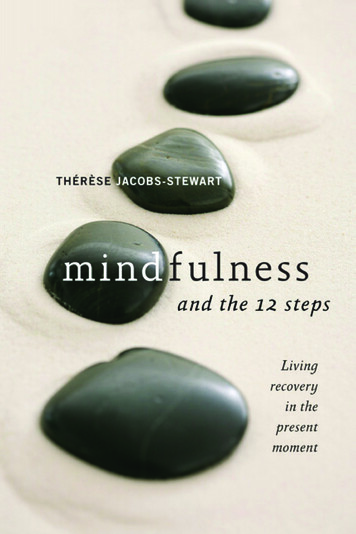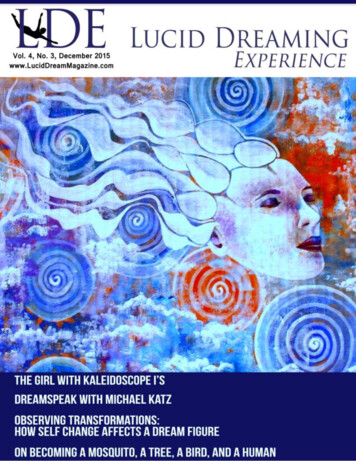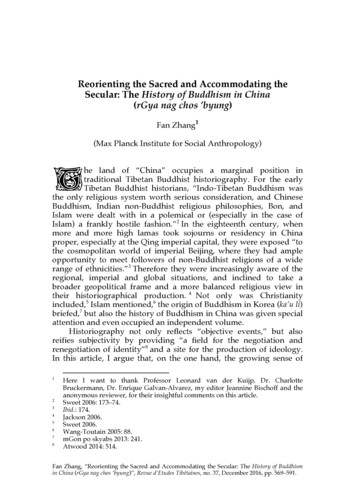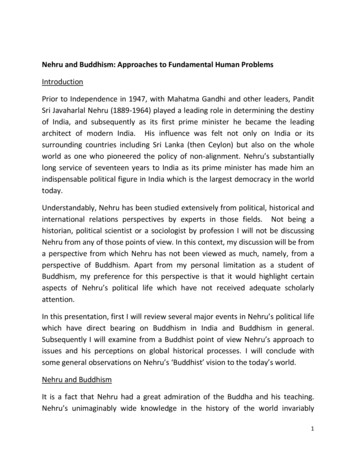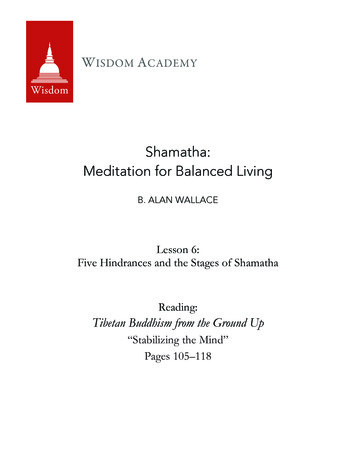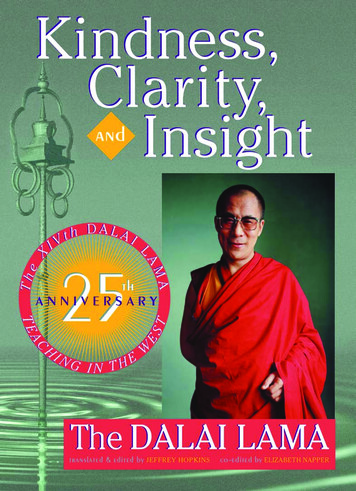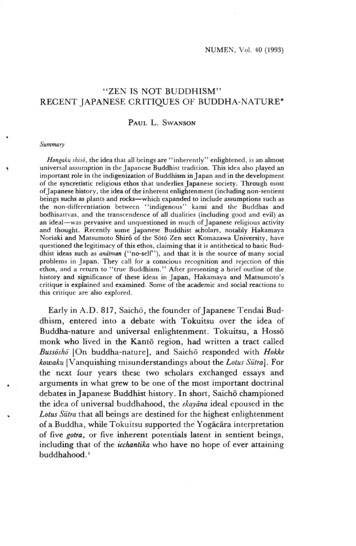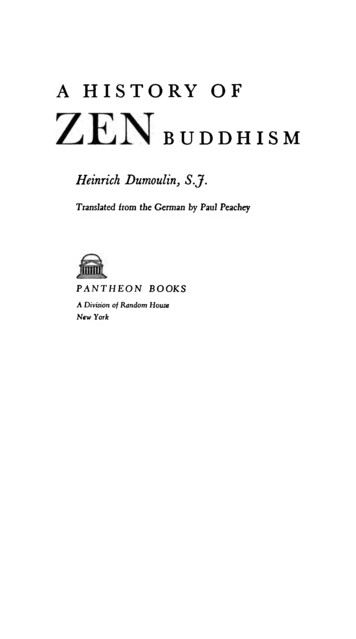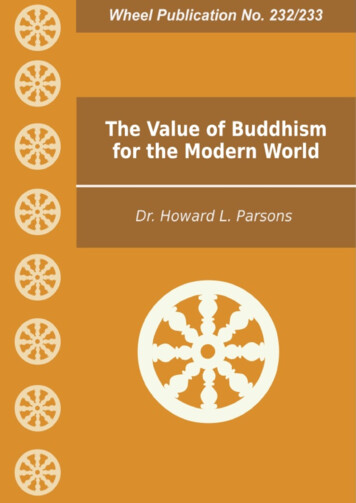
Transcription
The Value of Buddhismfor the Modern WorldByDr. Howard L. ParsonsBuddhist Publication SocietyKandy Sri LankaThe Wheel Publication No. 232–3Reprinted from The Mahā Bodhi (Calcutta) Vol. 82, Nos. 3, 10,11/1,2 (1974)Digital Transcription Source: Buddhist Publication SocietyFor free distribution. This work may be republished,reformatted, reprinted and redistributed in any medium.However, any such republication and redistribution is to bemade available to the public on a free and unrestricted basisand translations and other derivative works are to be clearlymarked as such and the Buddhist Publication Society is to2
be acknowledged as the original publisher.3
The Value of Buddhism for theModern World“Every living and healthy religion,” Santayana hassaid, “has a marked idiosyncrasy. Its powerconsists in its special and surprising messageand in the bias which that revelation gives to life.” What isthe special and surprising message of Buddhism? What isthe lasting revelation of its leader, Gotama Buddha? We areconcerned here not merely with Gotama’s utility for pastgenerations (though that has been great) but with the truthof his moral vision for all human times and hence formodern times.Let us consider first his conception of the problem of humanlife, and second his conception of its solution.IThe problem of our lives begins in the fact that we arealways beset by problems. Human life is problematic.4
Scarcely do we achieve settlement and certainty than we areunsettled by new difficulties. Fixities and finalities elude us.In the words of Gotama’s younger contemporary, Heraclitusof Ephesus, “All things flow; nothing abides.” Heraclitus,like Gotama, must have been caught in that “urbanrevolution” that swept ancient civilizations, and he musthave seen that no perspective, no culture, no standardultimately stands: “we are and we are not.”The problem of human life can be expressed otherwise. Manis born without a fixed identity. He is born without instincts—except, if you will, the instinct to live and to learn and togrow. Man is indeterminate at birth. In consequence, his lifeis a quest; man is a wanderer and a pilgrim, seeking anidentity, a role, and a home. Man’s symbolism is both causeand result of this quest. For in virtue of the fact that heacquires and invents languages the continuous choiceamong many alternatives and roles forces itself upon him,and he lives, unlike the animals, in a tower of Babel; and hisattempt to find a determination for his own life in the midstof myriad possibilities drives him to adopt this or thatsymbolic role for himself. Thus we go through life seeking,asking and knocking—trying to discover who we are tryingto fulfil our natures. The ultimate problem of life, whichman has sought to solve through his religious activity, isjust this: Who am I? How might I and others achieve themost abundant fulfilment possible?This problem expresses itself at two levels. First of all, manis incomplete in so far as the basic hungers of his body and5
personality go unmet. The power of these needs is coercive;and when they are not fulfilled man experiences pain.Primitive religion is primarily an attempt to cope with suchpain, through various techniques. But man is incompleteand consequently questing at another level. Not only do hisappetites lack completion; something else cries out forfulfilment. Not only does man seek food, crops, game, amate, children, a long and approved life; man wants anidentity and a fulfilment greater than any of these particularfulfilments. Not only does man undergo privation and painand eventual death; he knows, as Pascal says, that he dies.And so he enters into the realm of suffering. Suffering arisesout of a sense of the difference between what is and whatmight be. It is the tragic sense. It is the realisation thatcreative possibilities have not or will not be fulfilled: thatman can never fully “find” or complete himself; that time isgreater than one moment, and eternity vaster than time; thatdeath conquers individual life, but that collective lifetranscends individual death; that no matter how rich or fulla single life may be, it cannot begin to encompass therichness and fullness of the multiform cosmic life around it,and is destined to be singular and lonely in the midst of thatgreat abundance. Even the primitive religions representinchoate efforts to deal with this problem and to find a fullysatisfying identity. The advanced religions of mankind giveovert expression to this side of man’s problem—hissuffering—and endeavour to cope with it, in thought andaction; and Gotama must be seen as one of those who thus6
struggled with the problem of suffering.There is a secondary aspect to the problem of humansuffering. Our deep desire to find an identity leads to theadoption of some role which at the outset seems to satisfythe need for identity yet at the same time frustrates thatvery need; for we are often not fully satisfied with oneparticular role, yet our very adoption of it, necessitated byour need, has led us to take it up with fervent loyalty and,perhaps, with idolatry. We continuously seek closure in ourmeanings and identities, yet we cannot tolerate theconstrictions they lay upon us, for we demand newer anddeeper identities. Moreover, if we live long enough, theprocesses of living crack open the closures we have builtand force us to construct new meanings and roles. Thus ourroles come to dominate us; we fain would let them go, yetwe cannot. So we find that we are enslaved by our owndesire for freedom. Our quest for identity seems doomed.For this inveterate desire for identity issues in habits and incharacter-structure which is well nigh impossible to breakand which must yet be broken if we are to be liberated andsaved from constriction and death. In Paul’s language, “thegood that I would, I do not; but the evil which I would not,that I do. O wretched man that I am! Who shall deliver mefrom the body of this death?”We are doomed to this kind of death in life because we arecaught up in a partial commitment and in the domination ofa demonic good. This death is not physical annihilation butis on the contrary the torture which one must suffer who7
cannot die; it is, in the language of Gotama’s India, karmaand rebirth; it is the perpetuation of compulsive passion andthe continuation of that fatal winding of a chain (nidānas) ofevents which begins in indigenous ignorance and issuesalways in suffering. For while in a sense we do die when theobject of our devotion and the symbol of our identitychanges or passes away—since “decay is inherent in allcompound things”—yet our dispositions (guṇas, as theSaṅkhya calls them) persist and continue to give rise to thesame old structures of habit of the same old Adam.The whole doctrine of the non-existence of the soul (anattavāda) and that of “dependent origination” are designed todeal with the age-old problem of the past and to do so in away that lends the problem to moral solution. To say thatrebirth takes place without anything substantial migrating(after the manner of a seal being pressed upon wax) is to saythat a man’s past character is his fate but that he canmoment by moment change his character. These doctrineshave both a metaphysical and moral advantage, becausethey avoid the tyranny of eternalism and the hopelessnessof nihilism. To describe our suffering as caused bydispositions and habits is to take the first step toward theirremoval.Buddha’s personal success and widespread appeal lie partlyin the directness of his approach. He begins with the primefact of unhappiness. Pain and suffering are recurrent andunceasing. We crave and yearn for what is or what is not;and when we obtain it, we yet yearn for more. We, like all8
things, change: health passes into sickness, youth into oldage, and life into death. But we insist on setting our heartsor minds on something that does not seem to change—andwe always suffer disappointment. Yet, even to have whatwe want is pain; for no matter what we want or what weget, we are never satisfied. Man oscillates, as Schopenhauersays, between the restlessness of need and the boredom ofsatiety, and his will is forever uneasy. Lacking a genericsense of satisfaction, man cannot help feeling that his life isa mistake and a miscarriage; he suffers, in Spinoza’slanguage, the sadness that is deeper than any specificdisappointment or ennui; that is the sadness of the life-urgeitself, the sadness of impotence.If we suffer, what are we, and what are the sources in usthat lead to suffering? Much of traditional religious andphilosophical thought directly contradicts the answer thatGotama gives to this question. That thought holds that inthe midst of untruth, darkness, death, incompletion, change,and time, there abides a truth, light, life, completion,permanence, and eternity to which man must turn if he is tobe saved from suffering; man’s primal error, therefore,consists in his “fall” from this domain of permanence intothe domain of change, which he mistakes for the permanent.But Gotama’s analysis is different. He does agree withtraditional Hindu thought in asserting that man’s first majormistake is to take as real and important what is at bottomillusory, namely, the empirical self. But he radically departsfrom that tradition and indeed all the great religious9
traditions by holding, like Hume, that the self is nothingmore than a complex of ingredients, a bundle or a stream ofmatter and of perception, a collection of body, mind, andformless consciousness. Here he typically rejects two logicalextremes, materialism and idealism (and their uneasycompromise, dualism). Not only is there no permanent self;there is no permanent ātman, within or beyond, human orsuper-human; there is nothing permanent, here or hereafter, to which man can turn for guidance, succour orrefuge.The term “self”, therefore, has no fixed referent, for what itcommonly denotes is, in time, a changing stream, and, inspace, an aggregate of five khandhas or “graspings” boundtogether in an interaction that forever changes. Thesegraspings—the body, feelings, ideas based on senseperception, instinctual and subconscious drives, andconscious evaluations—are the essence of the organism andits individuality, if we may speak of that. The organism andits parts clutches, selects, and organises; it prehends, inWhitehead’s sense, its world; it lays hold of, completes,forms, transforms, and retains its world. These khandhas arethe seat of our loves and hates, hopes and fears, joys andsorrows; for they are polar, and as such participate in thepervasive and ceaseless opposition in the world. To act onthe presupposition that our self is identical with thesekhandhas is to be clutched by their clutchings and to becaught up in their oscillations and to suffer the sadness ordisappointment or the outworn satisfactions which they10
undergo. Man’s problem is that, in the midst of incompletemeanings and values, he is driven to find and assert someform of completion, but his assertions, however satisfyingand complete they seem to be, never ultimately satisfy andalways remain partial and mutable. No matter what the selfidentifies itself with, it cannot seem to find a final andsovereign identity.In time, the self is a stream, and with great penetrationGotama analyses the causal chain that leads him backwardfrom suffering to its ultimate source. We should not sufferhad we not first been born as a result of our predispositionto birth and, behind that, our mental clinging to objects.Clinging is due to thirst or taṇhā—the consequence, in turn,of sense experience, sense-object contact, and the organs ofknowledge. These led us back to the embryo and its cause insome incipient awareness—the product of experiences insome past life, which derive at last from ignorance or avijjā.Avijjā is the blindness of all organismic striving; it is theGreek eros, Hobbes’ “appetite” and “aversion,” Spinoza’s“power,” Schopenhauer’s “will to live,” Nietzsche’s “will topower,” and Bergson’s “elan vital.” We suffer. Why? We aredriven blindly to hold what we have and to obtain what wehave not. In our consciousness we keep and cling to whatwe are and have; in the depths of our unconsciousness wereturn to what we have lost or have imperfectly kept, andseek to grasp it firmly, re-enacting the tragic temptation ofFaust: “Ah, still delay, thou art so fair.” And why? We knownot why. And this ignorance of ours is the root of the whole11
matter.In a word, it is our own illusory habit-structure, taken asreal and all-important, that destroys us. Behind that lies ourtendency to grasp things and fasten upon them as final—our ignorance. We believe in the wrong things because weblindly grasp at any image that seems to promise closure,meaning, satisfaction, and fulfilment. For Gotama “what isimpermanent is suffering, what is suffering is not I; what isnot I is not mine, it is not I, it is not myself.” Salvation isachieved by both an intellectual and active conquest overthe craving or thirst that bedevils man. It is achieved bynon-attached work, work which no more elicits selfdestructive loyalties than the sowing of fried seeds elicitsplants. Such work carries a double blessing. It saves thedoer from involvement, and it ministers objectively andhence effectively to the person or situation.Man “hankers” after the world, says the Buddhist literature,and as a result is “tainted” by lusts, by the desire forcontinued sensuous experience, and by ignorance. Passion,aversion, and confusion beset him. In the vivid words of theDhammapada, “The thirst of a thoughtless man grows like acreeper; he runs from life to life, like a monkey seeking fruitin the forest.” He is on fire with the fiery movement of theworld. Buddhism has been criticised because in its attack onthe “self” and “selfish” craving it has appeared to contradictits contention that the self is illusory and, further, that theself enjoys nirvana. But this criticism springs from thefailure to understand that when Buddhism attacks selfish12
craving it attacks something partial, self-limiting, anddemonic. The self of our desires and values does havepower so long as we delegate it that power. The centre ofthis partial and illusory “self” is man’s basic biotic tenacityas conditioned by culture—his craving for the things andvalues of the world. But “the world,” as the Idealists haveinsisted, is always “my world;” the world which I have andcherish in apperception and action is my ego; it comprisesmy loyalties, my source of support and affection, my role,my identity. To crave, love, preserve, protect, and defendone’s world, therefore, is to crave, love, preserve, protect,and defend one’s self. Trespass on a man’s property andyou trespass on him; ridicule a man’s ideas and his worldconception, and you ridicule him.Craving entails clinging, and the root of clinging is demand.We not only want what we want; we demand it. We moveheaven and earth to get it; we turn reason intorationalisation, honour into chicanery, people into means,and opportunity into expediency, in order to get what wewant. We cannot live without it, and if we must go withoutit we see to it that others will share our misery and gowithout it too. Why do we not only demand things but alsodemand that, once had, they must be kept? Here, Gotama’sanswer, by implication, is close to that of Jesus; we feelanxious for our life. Gotama put it positively: we are drivenby an ignorant impulse to live and to build our lives aroundthe forms of our values. Thus we tend to elaborate andintegrate our way of life as though it were the be-all and the13
end-all of existence, and when it is threatened we fightdesperately in its defence. We tend to weave the loosethreads of meaning in our lives into some pattern ofpersonal identification. We tend to bring into closure thequalities and forms of our experience and to endow thatclosure with some character of finality in importance. Theclosures we choose will vary with body-type, temperament,cultural tradition, and socio-economic condition. They willbe predominantly personal and idiosyncratic or will reflectthe dominant ideology of environment: idealism, vitalism,or materialism; aristocracy, or democracy; the authority oflaw, force, or sensuous satisfactions. We tend to invest suchmeanings with impervious or charismatic powers; at last itbecomes difficult to undo our belief and loyalty towardthem.Anyone who has sought to change himself or others or thesocial order which sustains us knows the truth of the viewexpressed in “The Authoritarian Personality”: [1] “Thetransformation of our social system from somethingdynamic into something conservative, a status quo,struggling for its perpetuation, is reflected by the attitudesand opinions of all those who, for reasons of vested interestsor psychological conditions, identify themselves with theexisting set up. In order not to undermine their own patternof identification, they unconsciously do not want to knowtoo much and are ready to accept superficial or distortedinformation as long as it confirms the world in which theywant to go on living.” Thirst, craving, taṇhā, not only14
expresses itself in the demand to have and to keep; itinvolves the “great refusal” to consider alternatives to one’sbeliefs and way of life and indeed positive resistance againstwhat encroaches on what one views as all-important,namely, one’s world, one’s world view, one’s self. And thisstubbornness persists often in the face of great suffering.IIWhat is the solution? We may mention four (among others)responses that are required on the part of man if he is to bedelivered from the continuous wheel of unhappiness and tofind fulfilment in this life. They are: understanding,renunciation, resolution and compassion.(1) An indispensable attitude is understanding. This isindicated by the nature of our malady, avijjā, which isliterally lack of vision or insight. Where there is no vision—spiritual vision—the people perish. For without vision weare blind, and our efforts to save others become the blindleading the blind. Blindness is the brute, unconsidered beliefthat what lies before us as the object of our appetite oraversion is real; that the whole complex of our sensuousexperience is ultimate; that this complex comprises ourbeing and that nothing more exists; that when this goes allgoes; that our whole duty consists in preserving that15
complex of perception and self against change and decay;and that we ought properly to fear for its passing.Ignorance, in short, is not only impulsiveness, “a perpetualand restless desire of power which ceaseth only in death,”in Hobbes’ phrase; it is the blind demand for the sustenanceand preservation of that impulsiveness.To understand, therefore, is to understand this primal factof the primate creature. To understand is to delayimmediate response and belief; to check readiness andtendency to clutch; to transmute stimuli into signs andsignals into symbols; in short, to see the world andourselves for what they are, namely, appearances inpassage. In detail, right understanding or right viewsinvolves a knowledge of the four noble truths: the problemof suffering, the cause of suffering, the solubility of theproblem, and the solution or eightfold path. Understanding,therefore, is the master-key which unlocks the door toliberation. But it is also a watchful eye which must be evervigilant, since passion, aversion, and confusion ever dog oursteps. For lest we be destroyed by ignorance and the cravingand clinging which come from it, we must ourselves, withactive understanding, destroy the source of our destruction.Understanding is thus not to be theoretical or speculative; isnot even to be theological, nor to develop the subtleties ofpsychology. It is to be directed to the immediate problem ofthe removal of the cause of suffering, as a physician wouldseek immediately to remove an arrow from a woundedman. This practicality characterises many of the great16
religious founders and prophets; and this is why it isimpossible to ascribe a definitive theology or creed to them;they plunged ahead, to sweat it out on the job before them.This is why, too, diverse theologies and psychologies havefollowed in their train: the same set of human values may bejustified by a variety of theoretical schemes. The problem ofhuman life is not to grasp the metaphysical secret of theworld, as Gotama knew from personal experience, or totranscend it by mortification of the flesh. The problem is notmerely to understand it, but, as Marx would say, to changeit through understanding it. The problem, as Henry N.Wieman has put it, is for one to probe beneath the consciousbeliefs and habits of the mind to the concrete reality that infact sustains and fulfils one, and indeed to “relinquish everybelief as the basis of his security”, finding “what operates inhuman life with such character and power that it willtransform man as he cannot transform himself, saving himfrom evil and leading him to the best that human life canever reach, provided that he meets the required conditions.”Thought, therefore, must pass beyond its abstract task ofanalysis and synthesis to the practical task of saving manfrom his suffering and carrying him over into fulfilment.This task of thought has not always been consistently oreffectively pursued in Buddhism; it has tended tooverestimate the power and importance of the consciousmind. But certainly its original aim was pragmatic, and thespirit of Gotama is existential rather than intellectual.The importance of thought in the viewpoint of Buddhism,17
cannot be underestimated. It is stated in the very first verseof the Dhammapada: “All that we are is the result of whatwe have thought: it is founded on our thoughts, it is madeup of our thoughts. If a man speaks or acts with an evilthought, pain follows him, as the wheel follows the foot ofthe ox that draws the carriage.” The source of our lives andhence of our happiness or unhappiness is, in Buddhism,entirely within our power; were this not at least partially so,then we should all be victims of personal karma or thearbitrary power of historical and natural processes. And thesource of our lives is our thought. Since a good tree cannotbring forth evil fruit, neither can a corrupt tree bring forthgood fruit, and since we all seek the good, the moral forhuman action is plain.Understanding brings mastery and a sense of innerstrength, not alone in the consequences it produces but alsoin its intrinsic quality. To understand is to see that “allforms are unreal all created things are grief and pain all created things perish;” it is to trace out the lineaments ofthings in their internal structure and their relations to otherthings in space and time; it is to acknowledge the paths ofnecessitation which things pursue as they come into being,change, and pass away. Truth in this sense inducestranquillity and strength in him who possesses it and whosemind is moulded and purified by a selfless acquiescence inthe nature of things. For truth, as Spinoza observed, expelsand purges that sense of impotence and sadness, that fearand hatred, which come when we are made slaves to the18
forces and fates of the world. Truth, by its power to lift usabove what is circumstantial and passing, also lifts us free ofthose “passive” emotions which play upon our affectionswilly-nilly and undermine our integrity. When we can belike a Buddha who “by himself thoroughly knows and sees,as it were, face to face this universe—including the worldsabove, the gods, the Brahmas, and the Māras, and the worldbelow with its recluses and Brahmans, its princes andpeoples,” then we will indeed be liberated from humanbondage and know what it means to speak of the truth as“lovely in its origin, lovely in its progress, lovely in itsconsummation.” Understanding can issue in that fortitudewhich expresses itself as strength of mind and generosity (asSpinoza said) because it is an active attitude that clears upthe confusion of blind impulse and its passion. While tosome Western minds, influenced by the spirit ofexperimental science, understanding in this sense may seemto be passive and quiescent, it is in fact a tremendous act oflabour, involving a penetration into the nature of humanlife; a continued mindfulness of what it has learned,discipline in speech, conduct, and livelihood, great resolveand effort, and concentration.Not only is thought an inescapable ingredient in all action; itis necessary to man’s salvation, for, as we have observed,man is born indeterminate, and salvation is not automatic.Some guide is needed, over and beyond the dispositions ofthe plastic body and the idiosyncrasies of culture. Buddhismis aware of this condition of man. There are no supernatural19
gods, a priori principles, or pre-existent, permanent souls onwhich man might, in his extremity, rely. But there is anobservable psychic law of cause and effect; and there is thepower of man’s thought, whereby man determines who heis, what his world is, and whether he suffers hell or enjoysbliss. But thought (presumably the Buddhists here mean toinclude unconscious thought, or imagery) guides action;and since only positive action can neutralise negativeactions, a change in man’s thought is the one thing needful.In a similar way, man’s emotions must be changed by him,that is, by his own thought. For hatred does not cease byinert passivity any more than it ceases by hatred; it ceasesby love, and love arises out of man’s truthful relation to hisworld.Buddhism’s emphasis on understanding may seem like atruism until one considers the vast numbers of people wholabour under superstition and have never moved out of itshalf-light to face, progressively, the emergent truth aboutthemselves and their world. They blindly and passionatelypursue their objects and goals; they toil at their tasks withthe brute patience of a bullock harnessed to a well wheel;and they become blind to the puniness, precariousness. andimpermanency of their lives and objects of satisfaction. “Asocial system,” said Whitehead, “is kept together by theblind force of instinctive actions, and of instinctive emotionsclustered around habits and prejudices.”To understand this fact, in the Buddhist sense, is to be liftedabove the level of the brute, and initiate a transformation20
that leads to liberation. Most of the time the mass of us liveunder the spell of the immediate, appetitive, and sensate, asif what is and has value for us always has been and alwaysmust be. We will fight to keep what we have; and if we havesurplus time and energy, we may even go out of our way toimpose our way of life on others. But to understand is to seethat things are not thus necessitated. This misery, thissuffering, this poverty, this oppression—they need not be!Things are everlastingly changing; it is man who saddlesthem with habit and custom and so, blindly andtyrannically, destroys himself and others. But as man hasmade himself, so he can, by unmaking himself, re-makehimself. By the intellectual realisation of this truth, with itshope, man can begin to get out from under the burden ofanxious compulsion, resignation and despair. He canacquire a sense of community with his fellow-men, and asense of the possibility for human good. Neither socialoppression nor personal unhappiness need to be; they canbe undone and the blindness of animal passion and habitcan be transcended. In the words of the Dhammapada, “Theworld does not know that we must all come to an end here;but those who know it, their quarrels cease at once.”Understanding has several aspects. It is, first, the perceptionof the world as flux and impermanence, and, with that, therealisation that suffering comes in consequence of ourattachments to the impermanent. It is, second, thedetachment that arises with that realisation—the releasefrom the tyranny which our values exercise over us. The21
khandhas are essentially valuational processes, gripping orletting go of the world, and holding us in their grip so longas we identify ourselves with their processes and theirproducts. To understand is to see, with detachment, that nosingle achievement, of ourselves, our families, our nations,our cultures, our race, is final, in fact or in value. Someinterpreters of Buddha and Buddhism are inclined to resttheir interpretation there; in such cases Buddha’s lesson is atbest a negative one. But beyond these meanings there is yetanother, if only implicit in Buddha’s teachings. That is notmerely what E. A. Burtta calls “continuity of moral growthtoward liberated integrity,” though it includes andpresupposes that. It is a whole-hearted commitment to away of life that is characterised by continuous andprogressive transformation, of understanding, surrender,courage, and compassion. It involves detachment fromspecific goods but also an appreciation of the uniqueparticularity of each good as it appears. This is the wholedoctrine of “enjoyment without possession” lifted to itsheight. Understanding has its own value and power; butbeyond that it fully humanises us by releasing ouremotional, active, and social powers from the dominationsand dependencies of the world and enabling us to liverichly through time with strength and joy.Understanding requires a kind of resolute renunciation ofitself. It must be touched by what the Ch’an masters calledcultivation through non-cultivation. The intellect must nottake itself too seriously. It must be sobered and softened by22
the realisation that underneath all metaphysical or religioussolemnity there is the sportive, child-like play of things; andthat behind every square corner in the geometric world ofthe intellect, lurks the imp of particularity to upset everycart of a System. Yet often more than one “nasty little fact”(as Thomas Huxley put it) is needed to destroy “a beautifultheory” or a social system; an intell
The Value of Buddhism for the Modern World By Dr. Howard L. Parsons Buddhist Publication Society Kandy Sri Lanka The Wheel Publication No. 232–3 Reprinted from The Mahā Bodhi (Calcutta) Vol. 82, Nos. 3, 10, 11/1,2 (1974) Digital Transcription Source: Buddhist Publication Soc
